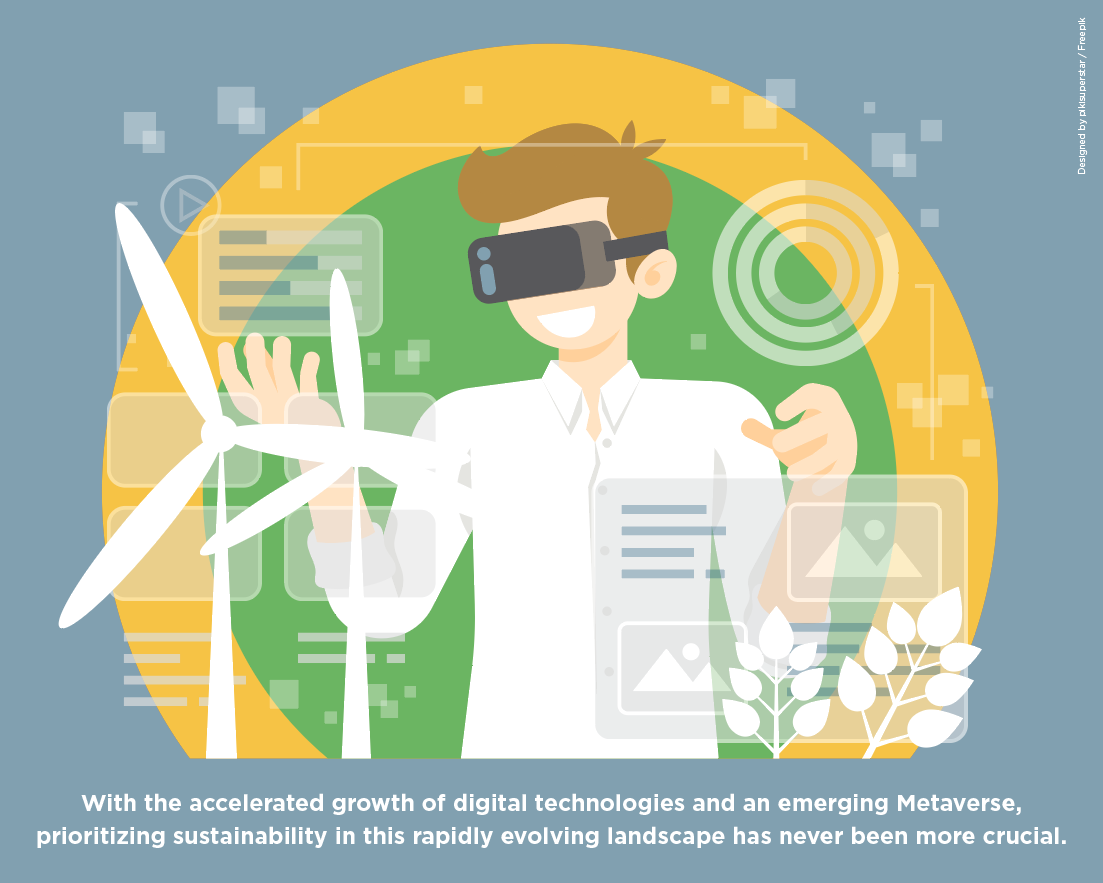The Metaverse — the increasingly popular immersive virtual realm where people can connect, interact, and explore — is now an emerging reality driven by the accelerated growth of digital technologies and market demand for them. By one estimate, over 400 million unique users worldwide visit this data-driven “landscape” every month. However, with the powerful technological breakthroughs that support valuable digital experiences comes the added responsibility to ensure that people can engage in the Metaverse safely, securely, and sustainably.
What is a “Sustainable” Metaverse?
Because the Metaverse centers around the digital landscape, it holds the potential to create a more equitable and sustainable world. But, to do this, the Metaverse must integrate sustainability into every facet of design and development. With a comprehensive framework, organizations can help foster a virtual realm that balances social, environmental, and economic factors. A completely sustainable Metaverse ensures teams prioritize long-term viability, inclusivity, and responsible practices to minimize possible negative impacts.
According to a survey by Wunderman Thompson Data, 71% of people who are conscious of the Metaverse said brands need to consider its environmental consequences. How are companies creating more sustainable digital landscapes? Some of the top strategies include highlighting:
- Energy efficiency: To cultivate energy efficiency within the Metaverse, organizations are optimizing server farms, data centers, and virtual environments — helping minimize both power consumption and carbon emissions.
- A scalable and adaptive infrastructure: Sustainable virtual realms require a foundation that can scale and adapt to changing needs as they come. Creating this foundation involves implementing flexible, cloud-based systems that more efficiently allocate resources and adequately accommodate growing user bases.
- Blockchain technology: Blockchain technology, which plays a progressively significant role in establishing a sustainable digital environment, provides decentralized and transparent systems that enhance security, trust, and accountability. Leveraging blockchain to create fair and inclusive virtual economies ensures data privacy.
- Renewable energy integration: Teams may consider embracing renewable energy sources, such as wind or solar power, to meet the energy demands of the Metaverse more sustainably. Clean energy remains the best alternative to help businesses reduce their reliance on fossil fuels and mitigate long-term environmental ramifications.
- User education and awareness: Developing a truly sustainable Metaverse will rely on more than just executives and supply chain leaders, but every individual across the organizational ladder. To ensure proper user education, companies can introduce initiatives that offer information on sustainable behaviors, promote responsible virtual practices, and encourage individuals to make the right choices within the digital realm.
Standards and Industry Codes of Conduct
As organizations take steps to construct a more sustainable Metaverse, it will be essential to consider the roles of regulation, governance, and administrative responsibility to mitigate potential threats in these virtual environments. Some of the top control-related issues for regulators to assess in the Metaverse include:
- Supporting personal data protection and preventing unauthorized access with data privacy and security measures,
- Addressing misinformation and hate speech that can spread quickly within digital landscapes with content moderation policies,
- Balancing the potential impacts on mental health through relevant laws,
- Preventing fraud, money laundering, and illicit activities with systems for virtual currencies and transactions, and
- Ensuring equal access and accommodation for individuals with disabilities and promoting inclusivity and non-discrimination by implementing accessibility standards.
Continuously monitoring prospective regulations will be critical, considering experts are already calling on players in the industry to create a “metacode of conduct.” This code would theoretically protect users from abuse, fraud, and loss until official legislation catches up.

Looking at the Metaverse through a Sustainable Lens
Not only are people increasingly aware of — and actively engaging in — the growing Metaverse, but statistics show that 38% of U.S. adults think this virtual world will improve life. These potential benefits include:
- Reduced environmental impact: Bringing sustainability to the forefront of organizational decisions minimizes the footprint caused by the Metaverse. Valuable opportunities to foster an energy-efficient infrastructure, use renewable energy sources, and optimize resource consumption will prove to be linchpins in mitigating climate change as virtual worlds expand.
- Enhanced diversity, equity, and inclusion (DEI): Digital landscapes provide a pathway to advanced DEI efforts. By ensuring accessibility, equal opportunities, and fair economic participation, equality and representation will be at the core of this online environment.
- Increased resilience: Fostering a Metaverse with sustainability in mind can boost financial and operational flexibility. This preparedness, along with data protection and scalability, helps teams reduce disruptions and promote long-term stability.
- Improved collaboration and knowledge sharing: A sustainable Metaverse facilitates enhanced global collaboration, cross-disciplinary cooperation, and an exchange of ideas that empowers innovation and collective problem-solving.
- Greater transparency and trust: Despite the growing recognition of the Metaverse, many individuals remain wary of this digital space. Fortunately, emphasizing sustainability promotes visibility and accountability. In addition, implementing ethical practices, data privacy, and decentralized systems helps companies build trust.
Drive Sustainability in the Metaverse with a Digitally Integrated Enterprise
Prioritizing sustainability across social, environmental, and economic factors can shape a virtual world that captivates and engages users and contributes positively to our collective future. With this in mind, business leaders are turning to cutting-edge solutions that help optimize operations, reduce waste, and minimize their environmental footprint within the Metaverse.
Inspirage can make life easier for IT and business personnel by empowering these professionals to embrace artificial intelligence, data analytics, and supply chain management. Our digital transformation expertise allows enterprises to operate effectively in immersive, interconnected digital environments that transcend physical limitations and promote sustainable practices.
Inspirage works with organizations to become agents of sustainable change, driving faster decision-making through strategic planning, process enablement, and actionable intelligence. Our team manages Oracle Cloud deployments and successfully aligns technological tools with sustainability responsibilities. If you are ready to digitally enable an integrated enterprise that supports the long-term viability and beneficial impact of the Metaverse, contact us today to learn more.